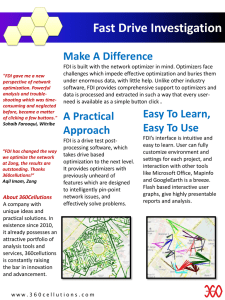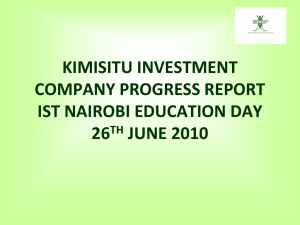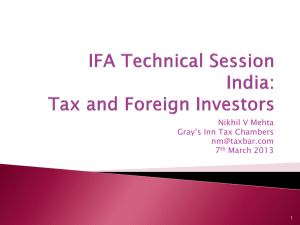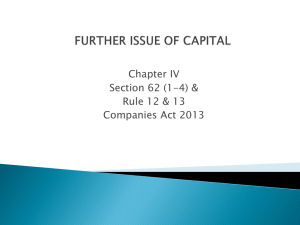Liaison Office
advertisement
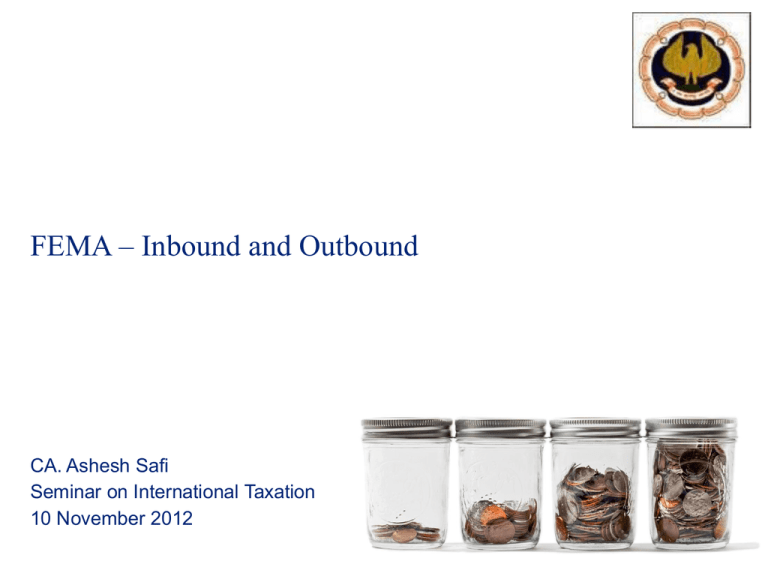
FEMA – Inbound and Outbound CA. Ashesh Safi Seminar on International Taxation 10 November 2012 Contents • Inbound investment ‒ Inflows into India ‒ FDI statistics ‒ Overall framework ‒ Exchange Control Regulations ‒ Liaison office / Branch office ‒ Project office ‒ Subsidiary ‒ Comparative Analysis • Outbound investment ‒ Exchange Control Regulations ‒ Definitions ‒ Overseas Direct Investment (ODI) Guidelines ‒ Transfer of shares 2 Inflows into India • India has been ranked at the 3rd place in global foreign direct investments in 2011 (Source: UNCTAD) • Inflows for the period April 2012 to August 2012 is US$ 8.17 billion which is 60% less than the corresponding figures of the earlier year • Services, Telecom and Construction sectors continue to bag the inflows 3 FDI Inflows in India 123120 98642 97320 56390 12871 44580 24584 18654 Source: www.dipp.nic.in Apr-Aug 12 2011-12 2010-11 2009-10 2008-09 2007-08 2006-07 2005-06 2004-05 2002-03 2003-04 10064 14653 10733 Years 4 165146 142829 2001-02 180,000.00 170,000.00 160,000.00 150,000.00 140,000.00 130,000.00 120,000.00 110,000.00 100,000.00 90,000.00 80,000.00 70,000.00 60,000.00 50,000.00 40,000.00 30,000.00 20,000.00 10,000.00 2000-01 INR in crores FDI Statistics Inbound Investment : Overall Framework 5 Inbound Investment – Overall Framework Exchange Control Regulations Competition Law Entry / Exit Regulations Reporting Corporate Law Industrial and Other Laws Indirect Tax Laws India Business Regulatory Compliances Monitoring SEBI Direct Tax Laws Employment Related Laws 6 Exchange Control Regulations 7 Exchange Control Regulation Investments into India Inbound investment regulated by Section 6(3)(b) of FEMA Section 6(6) of FEMA • RBI has the power to prohibit, restrict or regulate the transfer or issue of any security by a person resident outside India • RBI has the power to prohibit, restrict or regulate the establishment in India of a branch, office or other place of business by a person resident outside India for carrying out any activity relating to such branch, office or other place of business Regulation • RBI has issued FEM (Establishment in India of Branch or Office or Other Place of Business) Regulation, 2000 and FEM (Transfer or issue of security by a person resident outside India) Regulations, 2000 Master Circular • RBI issues annual Master Circular on "Foreign Investments in India" that deals with inbound investment in India – latest one is dated 2 July 2012 Consolidated FDI Policy 8 • Reserve Bank of India (RBI) • Department of Industrial Policy & Promotion (FC Section), Ministry of Commerce, Government of India • Ministry of Commerce and Industry (Department of Industrial Policy and Promotion), Government of India (GOI) has released Consolidated FDI Policy vide Circular 1 of 2012 dated 10 April 2012 which is effective from the same date Exchange Control Regulation Forms of Business Entities in India Foreign Investor Incorporated entities Direct presence Liaison Office Branch Office Project Office Foreign Exchange Management (Establishment in India of Branch or Office or Other Place of Business) Regulation, 2000 9 Subsidiary Partnerships Joint Venture LLP Foreign Exchange Management (Transfer or Issue of Security by a Person Resident Outside India) Regulation, 2000 and FDI Policy Liaison Office / Branch Office 10 Liaison Office / Branch Office Exchange Control implications • Overview • Permissible Activities • Approval Route • Additional Criteria for RBI Sanction • Setting up procedure and timeline • Application for undertaking additional activities or additional liaison offices • Compliance Procedures on a Regular Basis • Repatriation of Funds, Closure of LO / BO and Transfer of assets 11 Liaison Office / Branch Office Overview Liaison Office Branch Office Liaison Office (LO) is in the nature of a representative office to act as channel of communication between head office abroad and parties in India Section 2(9) of Companies Act, 1956 Branch Office (BO) in relation to a company means• any establishment described as a branch by the company; or • any establishment carrying on either the same or substantially the same activity as that carried on by the head office of the company, or • any establishment engaged in any production, processing or manufacture but does not include any establishment specified in any order made by the Central Government Regulated by the Foreign Exchange Management (Establishment in India of Branch or Office or Other Place of Business) Regulations, 2000 Prior approval of RBI is required 12 Liaison Office / Branch Office Permissible Activities Liaison Office Branch Office • • • • • • • 13 Representing in India the parent company / group companies Promoting export / import from / to India Promoting technical/financial collaborations between parent/group companies and companies in India Acting as a communication channel between the parent company and Indian companies Export / Import of goods Rendering professional or consultancy services Carrying out research work, in areas in which the parent company is engaged • Promoting technical or financial collaborations between Indian companies and parent or overseas group company. • Representing the parent company in India and acting as buying / selling agent in India • Rendering services in information technology and development of software in India. • Rendering technical support to the products supplied by parent/group companies • Foreign airline / shipping company Normally, the BO should be engaged in the activity in which the parent company is engaged. Liaison Office / Branch Office Approval Route The applications for establishing a LO / BO in India are considered by RBI under two routes: Approval Route RBI Route If principal business of the foreign entity falls under sectors where 100 % FDI is permissible under the automatic route 14 Government Route If principal business of the foreign entity falls under sectors where 100% FDI is not permissible or sectors where conditions are stipulated Liaison Office / Branch Office Additional Criteria for RBI Sanction Liaison Office Branch Office Track Record • A profit making track record during the immediately preceding 3 financial years in the home country Track Record • A profit making track record during the immediately preceding 5 financial years in the home country Net Worth • Net Worth as per last Audited Balance Sheet should not be less than USD 50,000 or its equivalent • Net Worth: Total of paid-up capital and free reserves, less intangible assets as per the latest Audited Balance Sheet or Account Statement certified by a Certified Public Accountant or any Registered Accounts Practitioner by whatever name called Net Worth • Net Worth as per last Audited Balance Sheet should not be less than USD 100,000 or its equivalent • Net Worth: Total of paid-up capital and free reserves, less intangible assets as per the latest Audited Balance Sheet or Account Statement certified by a Certified Public Accountant or any Registered Accounts Practitioner by whatever name called Applicant not satisfying the aforesaid eligibility criteria and are subsidiaries of other companies can submit a Letter of Comfort from their parent company 15 Liaison Office / Branch Office Setting up procedure and timeline Liaison Office Branch Office Approval • Approval initially granted for a period of 3 years and may be extended • Approval valid till revoked Procedure on setting up Application should be forwarded by the foreign entity through a designated Authorized Dealer (AD) Category - I bank, in Form FNC to the Chief General Manager-in-Charge, along with the prescribed documents including: • English version of certificate of incorporation/registration and Memorandum and Articles of Association attested by the Indian Embassy/Notary public in the country of registration • Latest Audited balance sheet of the applicant entity • Letter of Comfort, if applicable • 16 LO / BO established with the RBI’s approval will be allotted a Unique Identification Number (UIN) and also required to obtain Permanent Account Number (PAN) Liaison Office / Branch Office Application for undertaking additional activities or additional LO / BO • Request for establishing additional LO / BO may be submitted to RBI through the designated AD Category -I bank by filing duly signed Form FNC ‒ • • 17 No document to be submitted with Form FNC unless there is change If the number of offices exceeds 4, applicant has to justify the need for additional office Applicant to identify one of its offices in India as the Nodal office, which will coordinate the activities of all offices in India Liaison Office / Branch Office Compliance Procedures on Regular Basis Liaison Office Branch Office Annual Activity Certificate • An Annual Activity Certificate (AAC) alongwith audited balance sheet as at 31 March is to be filed on or before 30 September of every year to the following. ̶ Designated AD Category I bank; and ̶ Directorate General of Income Tax (International Tax), New Delhi • In case the year end is different than 31 March, the AAC can be submitted within 6 months from the due date of balance sheet • Combined AAC can be filed in case of multiple LO / BO • PAN is required to be quoted in AAC Additional information to Director General of Police • Additional information to be provided to Director General of Police (DGP) of state concerned in which LO / BO has established its office in India within 5 working days of LO / BO being functional. Such details mainly include; ̶ Details of head of office in India ̶ List of Personnel employed, including foreigners in Indian Office ̶ List and Details of foreigner other than employees who visited Indian office in connection with the activities of the Company ̶ Details of contact with Government Departments/PSU/Civil Society bodies/Trusts/ NGO • More than one LO / BO, reporting for all in each states is required • To be also filed annually alongwith copy of AAC report • To file the above details with AD Bank as well 18 Liaison Office / Branch Office Repatriation of Funds, Closure of LO / BO and Transfer of assets Liaison Office Branch Office Repatriation of funds • Not applicable, since no income generating activity is carried out • Repatriation of the profits is permissible subject to payment of income tax and production of audited financial statement and Chartered Accountants certificate Closure of LO / BO • Request to be submitted to AD • Report from ROC to be furnished regarding compliance with provisions of Companies Act, 1956 Transfer of assets • 19 Transfer of assets of LO / BO to subsidiaries or other LO / BO or any other entity is allowed with specific approval from RBI Liaison Office / Branch Office Income tax implications • Tax implications • Income tax – Recent Developments for LO • Income tax – Recent Cases 20 Liaison Office / Branch Office Tax implications Particulars Liaison Office Branch Office Taxability • • • • LO is restricted from earning any income in India Generally, not liable to tax in India • • Non-Resident under Act Taxable on its income arising or deemed to arise or income accruing or deemed to accrue in India. Deduction allowed for head office expenditure u/s 44C upto 5% of adjusted GTI Taxable @ 40% (plus applicable surcharge and cess) Qualify as a PE under the tax treaty Tax audit Not applicable Yes MAT provisions Not applicable Yes Filing of tax return Possible to take view that income tax return is not required to be filed. However, may consider to file a NIL return. Further, Form 49C is required to be filed electronically within 60 days from the end of financial year. Yes Transfer pricing Not applicable Yes Requirement to deduct tax Yes Yes Dividend Distribution Tax Not applicable Not applicable Branch Profit Tax Not applicable No; however, may apply in DTC Liaison Office Income tax – Recent Cases Metal One Corporation - [2012] 22 taxmann.com 77 (Delhi - Trib.) 22 Liaison Office of foreign company in India is not a PE in India in view of Article 5(6)(e) of Indo-Japan Tax Treaty since there was no violation noticed by RBI and AO could not brought on record information that the activity was beyond limits prescribed by RBI. Rolls Royce Plc – 339 ITR 147 (Del HC) The appellant was marketing and selling goods in India through Rolls Royce India Limited`s (UK company) offices in India. The High Court concurred with the ruling of the Tribunal in holding that the offices of RRIL, a liaison office, in India constituted a PE of the appellant and hence, a percentage of the profits for the marketing activities were attributable to such PE in India Columbia Sportswear Company – 337 ITR 407 (AAR) Liaison Office of a non-resident taxpayer would qualify as its business connection and PE in India if the activities of the Liaison Office are not confined to the purchase of goods in India for the purpose of export Project Office 23 Project Office (1) • General permission is granted to a foreign company to establish a Project Office (PO) in India to execute an awarded project. • A foreign company may open a PO in India provided it has secured a contract from an Indian company to execute a project in India and ‒ the project is funded directly by inward remittance from abroad; or ‒ the project is funded by a bilateral or multilateral International Financing Agency; or ‒ the project has been cleared by an appropriate authority; or ‒ a company or entity in India awarding the contract has been granted Term Loan by a Public Financial Institution or a bank in India for the project. • Further, the foreign company is required to report to the concerned Regional Office of RBI under whose jurisdiction the project office is set up, giving the following details ‒ Name and address of the Foreign Company ‒ Reference Number and date of letter awarding the contract referred to in clause (ii) of Regulation 5 ‒ Total amount of contract ‒ Address and tenure of PO ‒ Nature of Project undertaken 24 Project Office (2) • PO shall not undertake or carry on any other activity other than the activity relating and incidental to execution of the project. • Repatriation of the surplus is permissible subject to payment of income tax and production of the following documents ‒ Certified copy of the final audited project accounts. ‒ CA certificate showing the manner of arriving at the remittable surplus ‒ Income-tax assessment order or either documentary evidence showing payment of income-tax and other applicable taxes, or a CA certificate stating that sufficient funds have been set aside for meeting all Indian tax liabilities; and ‒ Auditor`s certificate stating that no statutory liabilities in respect of the Project are outstanding. • PO except in certain instances is normally considered as a permanent establishment of the parent company in India and the income attributable to the activities carried out by PO in India may be subject to tax in India. • Taxable at the rate of foreign company and MAT provisions are applicable • Furthermore, the transactions between the PO and its parent/associate companies would have to be in accordance with the prevalent transfer pricing guidelines in India. 25 Subsidiary 26 Subsidiary Diagrammatic presentation Foreign Investments FDI Automatic route PROI Portfolio Investments Venture Capital Investments Govt Route FII Other investments(G -sec, NCDs, etc.) FIIs NRI, PIO, QFI SEBI regd. FVCIs VCF, IVCUs 27 Investment on non repartriable basis NRI, PIO, QFI NRI, PIO Subsidiary Entry Route Investing in India Automatic route • Inform RBI within 30 days of remittance / Issue of shares. 28 Approval route • FIPB prior approval • Application for approval with FIPB. • Inform RBI within 30 days Subsidiary Sectoral view Sectors – Automatic Route (Illustrative) • Agriculture & Animal • • • • • husbandry NBFC (subject to minimum capitalization norms) Sectors – Prior Approval (Illustrative) • • Insurance – 26% Special Economic Zones Alcohol Distillation • Mining • Petroleum & Natural Gas • Cash & Carry wholesale Existing Airports beyond • Atomic energy 74% • Lottery, betting and Asset Reconstruction Companies - 49% • Broadcasting • Telecom Service beyond Private Sector Banking up to 49% Sectors – Negative List (Illustrative) 49% - 74% • Print Media • Tea Sector • Defence - 26% gambling • Business of chit fund • Nidhi company • Trading in Transferable Development Rights • and cigarettes trading • 29 Cigars, cheroots, cigarillos Real estate business Subsidiary Types of Instruments • Indian Companies can issue subject to pricing guidelines / valuation norms and reporting requirements Equity Shares • Fully and mandatorily convertible preference shares Fully and mandatorily convertible debentures within a specified time Issue other types of preference shares such as non-convertible, optionally convertible or partially convertible, which have to be in accordance with the External Commercial Borrowings (ECB) guidelines Price/Conversion formula of convertible capital instruments to be determined upfront at the time of issue of the instruments 30 Subsidiary FDI in Multi Brand Retail Trading (1) • FDI upto 51% is permitted under Government route vide Press Notes no. 4 & 5 dated September 20, 2012 subject to compliance with the following conditions • Certain salient features of the policy ‒ Minimum investment – USD 100 million ‒ Backend Infrastructure • At least 50% of total FDI brought shall be invested in 'backend infrastructure' within 3 years of the 1st tranche of FDI. • ‘Back-End Infrastructure’ will include capital expenditure on all activities, excluding that on front-end units. For instance, back-end infrastructure will include investment made towards processing, manufacturing, distribution, design improvement, quality control, packaging, logistics, storage, warehouse, agriculture market produce infrastructure etc. • Expenditure on land cost and rentals, if any, will not be counted for purposes of ‘backend infrastructure’. 31 Subsidiary FDI in Multi Brand Retail Trading (2) • Location for retail sales ‒ in cities with a population of more than 1 million as per 2011 Census and also covers an area of 10 kms around the municipal or urban agglomeration limits of such cities. ‒ In the states and Union territories not having cities with population of more than 1 million as per 2011 Census, in the cities of the choice of such State / Union territory, preferably the largest city and may also cover an area of 10 kms around the municipal or urban agglomeration limits of such cities. ‒ Retail locations are restricted to conforming areas as per the Master / Zonal Plans of the concerned cities and provision is made for requisite facilities such as transport connectivity and parking. ‒ For the rest of India, current FDI policy regime for Trading will continue i.e. 100% FDI is allowed in wholesale cash and carry trading. • • Compliance with applicable state / UT laws / regulations is required At least 30% of the procurement of manufactured / processed products should be sourced from Indian ‘small industries’ having investment in plant & machinery upto USD 1 million ‒ This valuation of USD 1 million refers to the value at the time of installation without providing for depreciation. ‒ If at any point in time, the valuation is exceeded, the industry shall not qualify as a 'small industry' for this purpose. 32 Subsidiary FDI in Multi Brand Retail Trading (3) • 5 year period is given for meeting the requirement of sourcing of 30%. ‒ • Retail sales outlets may be set up only in those States / Union Territories which have agreed or agree in future to allow FDI in MBRT under the FDI policy. Subject to FDI policy and location requirements, the respective State government to decide where a multi-brand retailer, with FDI, is permitted to establish its sales outlets within the State. Following states have given their concurrence to allow FDI in MBRT: • ‒ ‒ ‒ ‒ 33 Accordingly, the 1st compliance will be based on an average of 5 years total value of the manufactured / processed products purchased beginning 1st April of the year during which the 1st tranche of FDI is received. Thereafter, the mandatory procurement requirement has to be complied on an annual basis. Andhra Pradesh Maharashtra Assam Manipur Delhi Rajasthan Haryana Uttarakhand Jammu & Kashmir Daman & Diu and Dadra & Nagar Haveli (Union Territories) Agricultural products – first right with the Government Foreign companies to self-certify and ensure compliance of the stipulated conditions which could be cross checked as and when required. Foreign Investors are required to maintain accounts, duly certified by statutory auditors Retail trading, in any form, by means of e-commerce, is not permissible for companies with FDI, engaged in the activity of MBRT. Subsidiary FDI in Multi Brand Retail Trading (4) • • • 34 Agricultural products – first right with the Government Foreign companies to self-certify and ensure compliance of the stipulated conditions which could be cross checked as and when required. Retail trading, in any form, by means of e-commerce, is not permissible for companies with FDI, engaged in the activity of MBRT Subsidiary FDI in Civil Aviation Sector • Foreign airlines are allowed to invest, in the capital of Indian Companies (other than in Air India Limited) operating scheduled and non-scheduled air transport services, upto 49% of their paid up capital, subject to following conditions: ‒ It shall be made under Government approval route. ‒ 49% limit will subsume FDI and FII Investment. ‒ Investments shall be compliant of the relevant Securities laws such as SEBI (Issue of Capital and Disclosure Requirements) Regulations, SEBI (Substantial Acquisition of Shares and Takeovers) Regulations, as well as other applicable rules and regulations. ‒ A Scheduled Operator’s Permit can be granted only to a company: • registered in India and has its principal place of business within India; • whose Chairman and at least 2/3rd Directors are citizens of India; and • whose substantial ownership and effective control is vested in Indian nationals. ‒ All foreign nationals likely to be associated with the Indian Scheduled and Non-Scheduled air transport services, as a result of such investment, shall be cleared from security view point before deployment. ‒ All technical equipment that might be imported into India shall require clearance from the relevant authority in the Ministry of Civil Aviation, GOI. 35 Subsidiary FDI in Power Exchanges • FDI in Power Exchanges which are registered under the Central Electricity Regulatory Commission (Power Market) Regulations, 2010 is permitted • FDI upto 49% is permitted as under ‒ 26% - under FDI route with prior approval from Government; and ‒ 23% - for FII investments under automatic route • FII purchases shall be restricted to secondary market only; • The foreign investment to be in compliance with SEBI Regulations, other applicable laws and other conditions 36 Subsidiary FDI in Pharma sector • Initially 100% FDI in Pharmaceutical sector was permitted under automatic route • The Government of India vide press note No. 3 (2011 series) revised the investment limit as follows: ‒ FDI in green field investment in the pharmaceuticals sector - up to 100 per cent, under the automatic route ‒ FDI in brownfield investment (i.e. investments in existing companies), in the pharmaceutical sector up to 100 per cent under the Government approval route ‒ Recent report on recommendations of DEA constituted panel on FDI allowing for 49% investment under the automatic route for brownfield investments. Proposal with PMO. • Action proposed due to acquisition of various Indian pharmaceutical companies by multinational foreign corporations 37 Subsidiary Issuance of fresh shares • 38 Indian company may issue fresh shares/ convertible debentures under the FDI Scheme to a person resident outside India, who is eligible for investment in India, subject to compliance with the extant FDI policy and the FEMA Regulation Subsidiary Acquisition by way of transfer of existing shares (1) Transferor Transferee Mode of Transfer Person resident outside India – other than NRI & OCB Person resident outside India (including NRI but excluding OCB) Sale or gift; transfer by or to erstwhile OCB require prior approval of RBI Non-resident Indian Non-resident Indian Sale or gift Person resident outside India Person resident in India Gift or sale under private arrangement subject to conditions Person resident outside India Person resident in India Sell on recognised stock exchange Person resident in India Person resident outside India Sell under private arrangement subject to conditions Prior approval required for transaction not covered above 39 Subsidiary Acquisition by way of transfer of existing shares (2) Government Approval required • Transfer by resident to non residents by way of sale or otherwise requires government approval if ‒ ‒ Share of companies engaged in sector falls under the Government Route ; or Transfer results in breaching of the applicable sectoral cap RBI permission required • Transfer by residents to non residents by way of sale where the NR acquirer proposes deferment of payment of the consideration. • Transfer by a person resident in India, who intends to transfer any security, by way of gift to an NR • Transfer from NRI to NR requires the prior approval of the RBI 40 Subsidiary Issue of Rights/ Bonus Shares • An Indian company may issue Rights/Bonus shares to existing non-resident shareholders, subject to adherence to sectoral cap, reporting requirements etc. • Such issue should be in compliance with other laws/ statues like the Companies Act, 1956, SEBI (Issue of Capital and Disclosure Requirements), Regulations 2009, etc. • Issue of right shares to OCBs 41 ‒ Specific prior permission from RBI need to be taken for issuing rights shares to erstwhile OCBs ‒ However Bonus shares can be issued to erstwhile OCBs without approval from the RBI, provided the OCB is not on the adverse list of the RBI Subsidiary Issue of Shares under Employee Stock Option Scheme • An Indian company can issue shares to its employees or employees of its joint venture or wholly owned subsidiary abroad • Citizens of Bangladesh can invest with the prior approval of the FIPB • Shares can be issued directly or through a trust subject to the following conditions that 42 ‒ the scheme has been drawn in terms of the relevant regulations issued by the SEBI ‒ the face value of shares to be allotted does not exceed 5% of the paid-up capital of the issuing company Subsidiary Conversion of ECB/Lump sum Fee • General permission granted for conversion of ECB into shares / convertible debentures provided: ‒ Activity is covered under the Automatic Route or Government approval has been obtained ‒ FDI is within sectoral caps ‒ Pricing guidelines are followed ‒ Compliance under any other statute and regulation in force Conversion is available for ECBs due for payment or not, as well as secured / unsecured loans availed from non-resident collaborators • 43 General permission granted for issue of shares/ preference shares against lump sum technical know-how fee, royalty, etc ‒ Pricing guidelines of RBI/SEBI should be followed ‒ Compliance with applicable tax laws Subsidiary Import of capital goods by SEZs into Equity/Import payables • Issue of equity shares by units of SEZs to non-residents against import of capital goods is permitted subject to valuation by committee consisting of Development Commissioner and the appropriate Customs officials • Issue of equity shares against import of capital goods/ machinery/ equipment allowed under approval route 44 ‒ Import be in accordance with the EXIM policy and the FEMA regulations ‒ Independent valuation, preferably by an independent valuer from the country of import ‒ Application to indicate beneficial ownership and identity of importer company as well as overseas entity ‒ Applications be made within 180 days from the date of shipment of good Subsidiary Pre-incorporation/Share Swap • Issue of equity shares against pre-operative / pre-incorporation expenses (including payment of rent etc.) allowed under approval route subject to following: ‒ ‒ ‒ ‒ • 45 Submission of FIRC for remittance of funds by the overseas promoters for the expenditure incurred Verification and certification of expenses done by statutory auditor Payments being made directly by the foreign investor to the company Applications for capitalisation be made within the period of 180 days from the date of incorporation of the company Issue of shares to a non-resident against shares swap can be done by obtaining the approval of FIPB Subsidiary Pricing guidelines (1) • • Fresh issue of shares, issue against payment of lumpsum technical know how fee/ royalty, conversion of ECB into Equity, capitalization of pre-incorporation expenses/ import payables (with prior approval of government) ‒ For listed company, price as per SEBI guidelines ‒ For unlisted company, price not less than FMV of shares determined by a SEBI registered Merchant Banker or a CA as per the Discounted Cash Flow (DCF) Method Preferential Allotment ‒ • 46 Issue price shall not be less than the price as applicable to the transfer of shares from resident to non-resident Right Shares ‒ If listed, price as determined by the company ‒ If unlisted, price not less than the price at which the offer on right basis is made to a resident shareholder Subsidiary Pricing guidelines (2) • Acquisition / transfer of existing shares (private arrangement) i.e. from resident to a nonresident (i.e. incorporated non-resident entity other than erstwhile OCB, foreign national, NRI, FII) ‒ ‒ • For listed companies, negotiated price which shall not be less than the price certified by SEBI registered Merchant Banker or CA For unlisted companies, negotiated price which shall not be less than the FMV to be determined by the SEBI registered Merchant Banker or CA as per the DCF Method Issue price of convertible capital instruments to be determined upfront ‒ the price at the time of conversion should not be lower than the fair value at the time of issuance of such instruments 47 Subsidiary Reporting Requirements Sr. Particulars Compliance requirement 1 Intimation with • Details of inward remittance are respect to inward required to be reported to RBI remittance within 30 days from the date of receipt of remittance in Advance Reporting Form 2 Issue / Allotment of shares 3 4 5 48 Documents to be attached / required • Advance Reporting Form • Foreign Inward Remittance Certificate (FIRC) • Know Your Customer (KYC) report on the non-resident investor from the overseas bank remitting the amount • Share Certificates • Shares are required to be issued / allotted within 180 days from the date of receipt of remittance Intimation with • Post issue of shares, Part A of • Part A of Form FC-GPR respect to issue Form FC-GPR is required to be • Certificate from Company Secretary of shares filed with RBI within 30 days from • Valuation report from Statutory Auditor the date of issue / allotment of or Chartered Accountant determining the shares price of shares to be issued • FIRC Annual return of • Annual return on Foreign Liabilities • Annual Return on Foreign Liabilities and Foreign Liabilities and Assets is required to be filed Assets th and Asset in the specified format by 15 July of each year Reporting of • Post transfer of shares, reporting • Form FC-TRS transfer of shares in Form FC-TRS to be submitted to AD bank within 60 days from the date of receipt of amount Comparative Analysis 49 Comparative Analysis(1) Liaison Office • Can only undertake liaising / representing / promoting / communicating activities • Local expenses have to be met through inward remittances Branch Office • Can undertake activities – export / import of goods, professional / consultancy services, research work, technical / financial collaborations, buying / selling agent, IT services / development of software, technical support, foreign airline & shipping company • Cannot undertake retail trading activities, manufacturing / processing activities. • Can acquire property but not for leasing / renting Subsidiary/JV • Can carry out any activity specified in the memorandum of articles (subject to FDI guidelines) • Funding may be through equity, other forms of permitted capital infusion or internal accruals 50 Comparative Analysis(2) Particulars Liaison Office Branch Office Subsidiary Setting up (FEMA regulations) RBI approval required. RBI approval required. Incorporation of company, subsequent to obtaining requisite approval, if any Activities Only those activities which have been permitted by RBI Only those activities which have been permitted by RBI Can undertake any manufacturing, processing or service activity (In case of subsidiary of foreign company, only those activities in which direct investment is permitted as per the FDI policy of Government of India). Rate of tax on income Not Applicable 41.20%/42.024% 30.90%/32.445% Repatriation of profits Not Applicable Possible (subject to payment of tax) Possible (subject to Dividend Distribution Tax) 51 Outbound Investment 52 Exchange Control Regulation Investments outside India Outbound investment regulated by Section 6(3)(a) of FEMA 53 • Reserve Bank of India • Department of Industrial Policy & Promotion (FC Section), Ministry of Commerce, Government of India • RBI has the power to prohibit, restrict or regulate the transfer or issue of any foreign security by a person resident in India Regulation • RBI has issued FEM (Transfer or issue of any foreign security) Regulation, 2004 Master Circular • RBI issues annual Master Circular on “Direct Investments by Resident in Joint Ventures (JV) / Wholly Owned Subsidiary (WOS) Abroad" that deals with outbound investment outside India – latest one is dated 2 July 2012 Definition • Section 2(e) of the Regulation ‒ • Section 2(f) of the Regulation ‒ 54 “Direct investment outside India” investment by way of contribution to the capital or subscription to the Memorandum of Association of a foreign entity or by way of purchase of existing shares of a foreign entity either by market purchase or private placement or through stock exchange, but does not include portfolio investment. "Financial commitment" means the amount of direct investment by way of contribution to equity and loan and 100% of the amount of guarantees issued by an Indian party to or on behalf of its overseas Joint Venture Company or Wholly Owned Subsidiary. Overseas Direct Investment (ODI) Guidelines • No approval for investment by Indian companies in WOS/JV abroad provided: ‒ ‒ • Can invest up to 400% of net worth as per last audited balance sheet ‒ ‒ ‒ • Net worth means paid-up capital and free reserves as on date of last audited balance sheet Net worth of holding/ subsidiary can also be considered (if 51% shareholding); No limit for investment out of EEFC / ADR / GDR proceeds Limit of financial commitment of 400% covers: ‒ ‒ ‒ ‒ 55 Bona fide business activity; and Investment not in real estate or banking business 100% of the capital of WOS/JV or loan granted to WOS/JV; 100% of guarantees issued to or on behalf of WOS/JV excluding performance guarantee 100% of bank guarantee issued by resident bank on behalf of WOS / JV provided bank guarantee is backed by counter guarantee / collateral by Indian company 50% of performance guarantee issued by Indian company provided the invocation of performance guarantee results in outflow, breaching limit of financial commitment Overseas Direct Investment (ODI) Guidelines • Investment in overseas company through SPV is permitted under Automatic Route unless the name of Indian party appears on RBI Exporters caution list / list of defaulters to the banking system circulated by the RBI India or under investigation by any investigation/enforcement agency or regulatory body ‒ • Loan / guarantee can be given only if Indian company has some equity participation in WOS/JV ‒ • • If no equity, RBI approval may be required Specific approval of RBI is required for creating charge on immovable / movable property and other financial assets in favour of non-resident entity Other conditions to be satisfied ‒ ‒ ‒ ‒ 56 If name appears, prior approval of RBI is required Indian party should not be on the RBI Exporters caution list / list of defaulters to the banking system circulated by the RBI India or under investigation by any investigation/enforcement agency or regulatory body. All transactions relating to the investment should be routed through only one branch of an AD Bank To report such acquisition in Form ODI to the AD bank for submission to RBI within 30 days from the date of transactions If investment is by firm, the partners of firm should hold shares if required by the host country regulations Overseas Direct Investment (ODI) Guidelines • Valuation of investment in shares of existing company Particulars Valuation by If investment exceeds USD 5 mn Valuation of shares by Category I Merchant Banker registered with SEBI or an Investment banker / Merchant banker outside India registered with appropriate authority in the host country In all other cases Valuation by a Chartered Accountant or Certified Public Accountant • Indian company is obliged to ‒ ‒ ‒ 57 Receive share certificates within 6 months of the date of remittance; Repatriate all dues receivable (dividend etc) within 60 days of due date; To submit Annual Performance Report within 3 months of finalization of accounts of WOS/ JV in the prescribed format Transfer of shares • Transfer by way of sale of shares in WOS/JV permitted under automatic route subject to following conditions ‒ ‒ ‒ ‒ ‒ ‒ • Transfer by way of pledge of shares of WOS/JV as security for availing facilities from AD bank or Indian financial institution permitted ‒ • 58 Sale does not result in any write off of the investment made; If the shares are listed, sale should be through stock exchange; If the shares are unlisted, share price should not be less than the fair value certified by a CA / CPA, based on the latest audited financial statements; Indian party does not have any outstanding dues such as dividend, royalty, technical know-how fees, etc; Overseas SPV should have been in operation for at least one full year and Annual Performance Report along with audited accounts for that year has been submitted to RBI; Indian party is not under investigation by CBI / DoE / SEBI / IRDA or any other regulatory authority in India Pledge of shares with overseas lender permitted if lender is regulated and supervised as a bank and ODI limit is adhered to Transfer of shares should be reported to AD bank within 30 days from the date of divestment Glossary (1/2) AAC AD ADR BO DCF DBOD DR EOU FCCB FDI FEMA FMV FIPB INR JV LO Annual Activity Certificates Authorized Dealer American Depository Receipts Branch Office Discounted Cash Flow Department of Banking Operations and Development Depository Receipts Export oriented Unit Foreign Currency Convertible Bonds Foreign Direct Investment Foreign Exchange Management Act Fair Market Value Foreign Investment Promotion Board Indian National Rupee Joint Venture Liaison Office Glossary (2/2) NR Non Resident NRI Non Resident Indian PE Permanent Establishment RBI Reserve Bank of India SAST Substantial Acquisition of Shares and Takeovers SEBI Securities and Exchange Board of India SEZs Special Economic Zones STP Software Technology Park UNCTAD United Nations Conference on Trade and Development WOS Wholly Owned Subsidiary 60 Thank You 61

